Charles Cheminade Tarot
Marseille Tarot cards by Charles Cheminade of Grenoble, France, early 18th century.
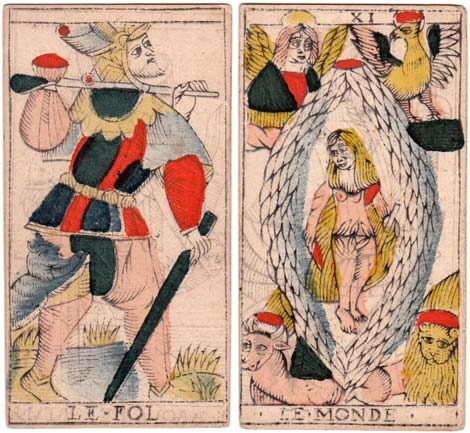
Charles Cheminade : Marseille Tarot
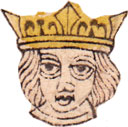
‘Marseille’ tarot cards, with Italian suit symbols on the minor cards, first arrived in France from Italy in the first half of the sixteenth century and then flourished in South-Eastern parts of France and neighbouring parts of Switzerland and North-West Italy. This particular example of ‘Tarot de Marseille’ cards by Charles Cheminade of Grenoble, France, dates from the first half of the 18th century and may have been made for export to any of those countries.
The Trump cards appear in the traditional order, with titles in French. The letter 'V' is used for 'U' (as in classical Roman inscriptions) and also some idiosyncrasies or corruptions in the spelling can be noted. For example, Le Chariot appears to be spelled “LECHARICR” and The Fool is titled “LE•FOL”. The Emperor appears to be numbered III but with an Arabic 4 lower down. The Death card is untitled and facing left. Court cards are titled Valet, Chevalier, Reine and Roy.
See also: Tarot de Marseille, Jean-Baptiste Madenié, Dijon probably before c.1739
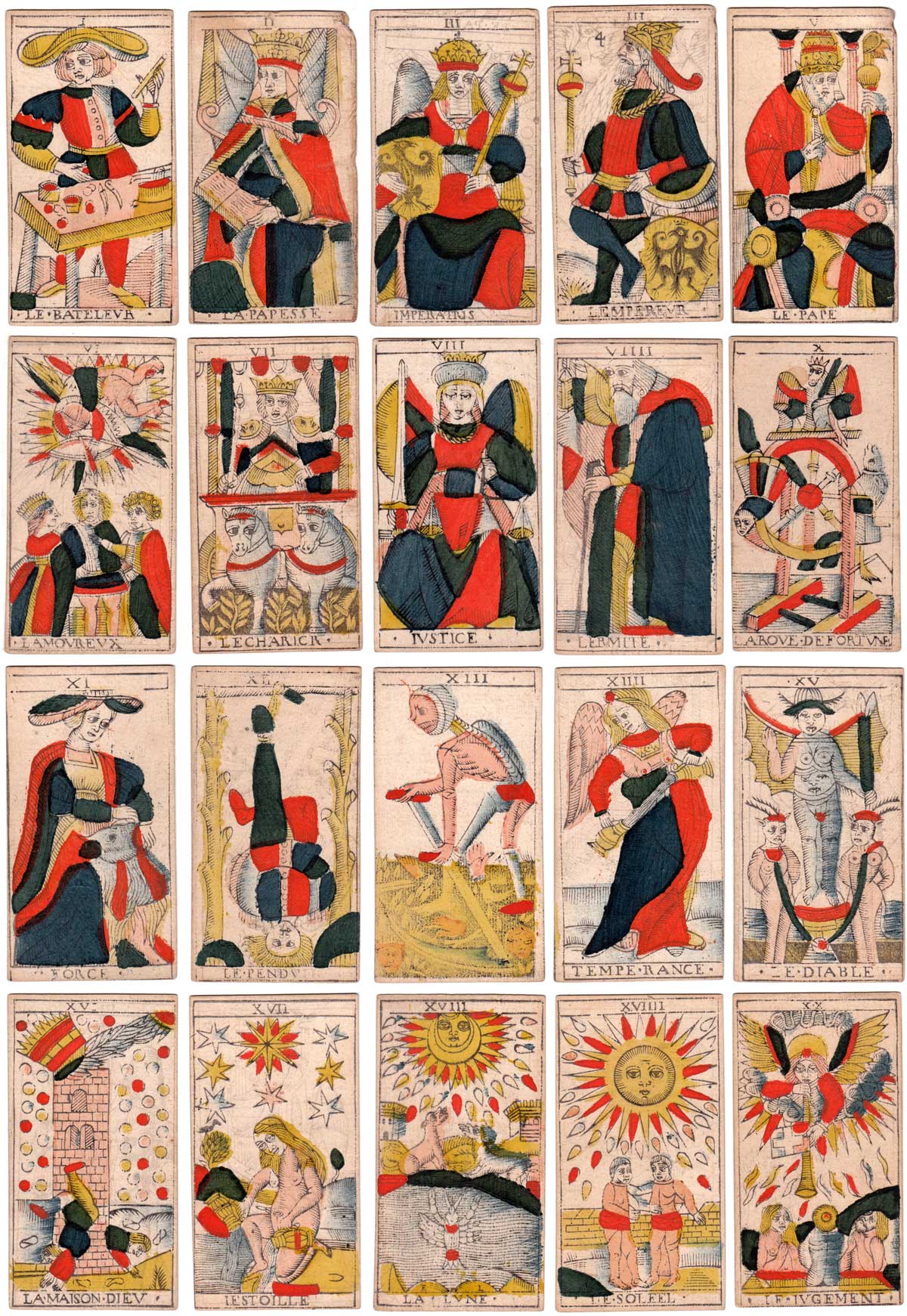
Above: Marseille Tarot Trump cards by Charles Cheminade of Grenoble (1714-44), France, early 18th century. Stencil-coloured woodblock printing. Card XX The Judgement, suggests the opening of a new life.
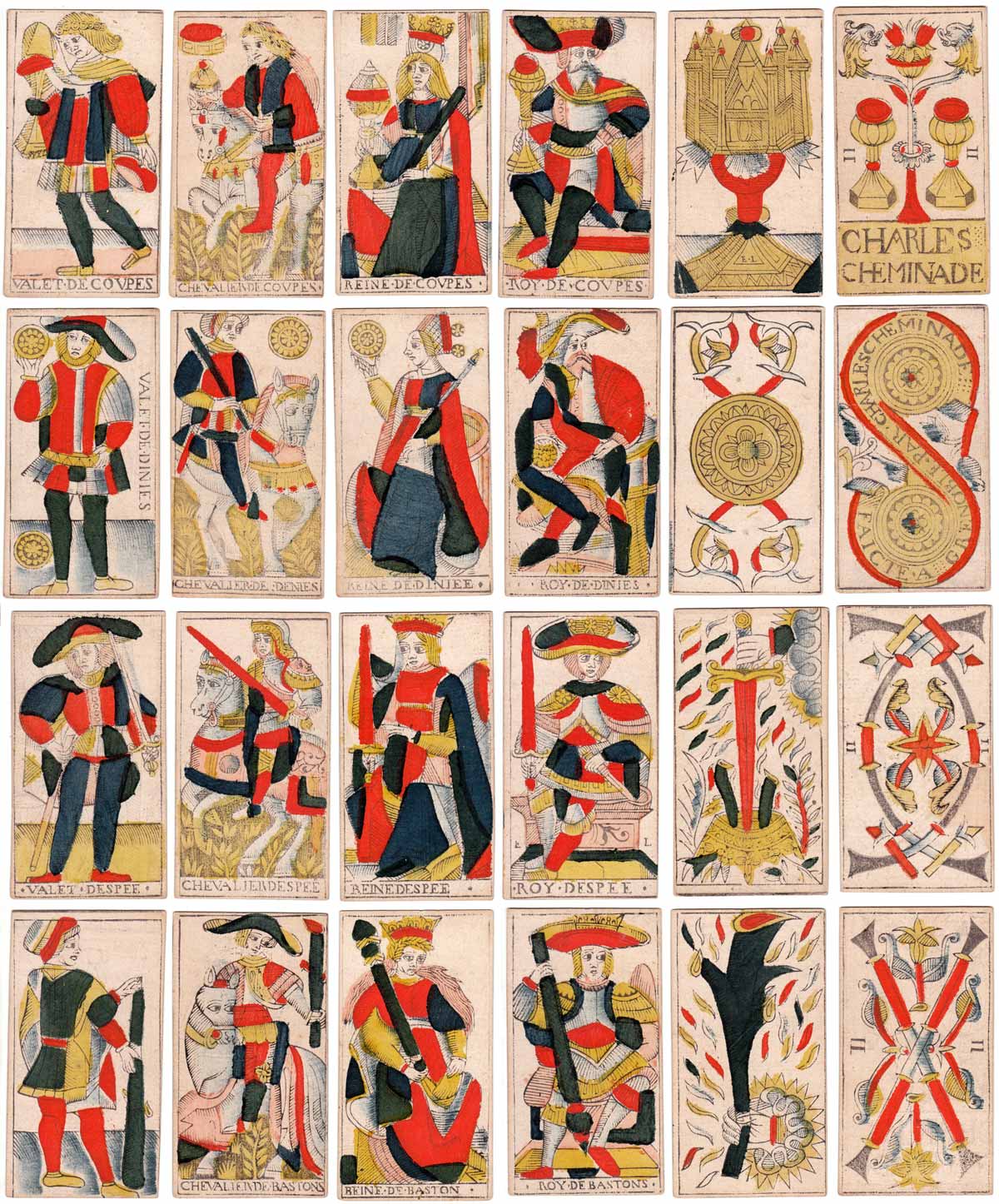
Above: Marseille Tarot court cards by Charles Cheminade of Grenoble (1714-44), early 18th century. Stencil-coloured woodblock printing. The court cards have a touch of the South of France about them compared to Italian versions. All images courtesy Rex Pitts.
By Rex Pitts (1940-2021)
United Kingdom • Member since January 30, 2009
Rex's main interest was in card games, because, he said, they were cheap and easy to get hold of in his early days of collecting. He is well known for his extensive knowledge of Pepys games and his book is on the bookshelves of many.
His other interest was non-standard playing cards. He also had collections of sheet music, music CDs, models of London buses, London Transport timetables and maps and other objects that intrigued him.
Rex had a chequered career at school. He was expelled twice, on one occasion for smoking! Despite this he trained as a radio engineer and worked for the BBC in the World Service.
Later he moved into sales and worked for a firm that made all kinds of packaging, a job he enjoyed until his retirement. He became an expert on boxes and would always investigate those that held his cards. He could always recognize a box made for Pepys, which were the same as those of Alf Cooke’s Universal Playing Card Company, who printed the card games. This interest changed into an ability to make and mend boxes, which he did with great dexterity. He loved this kind of handicraft work.
His dexterity of hand and eye soon led to his making card games of his own design. He spent hours and hours carefully cutting them out and colouring them by hand.

Leave a Reply
Your Name
Just nowRelated Articles
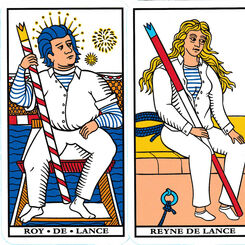
Le Tarot de Sète
Reinterpretation of the Tarot de Marseille by Julien Labat, an artist from Sète.
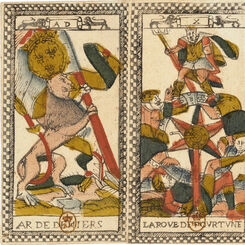
The Parisian Tarot
The “Parisian Tarot”, early 1600s, with imagery and design synthesizing several influences.
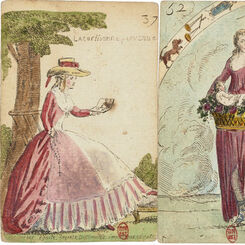
Jeu de Cartomancie pour l’amusement des Dames
Early French Cartomancy deck "for the amusement of Ladies" but also referred to as "Jeu divinatoire ...
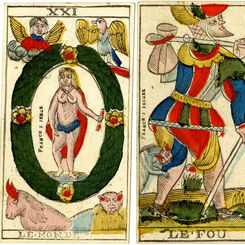
Besançon Tarot by Jacob Jerger
Besançon tarot published by Jacob Jerger, 18th century.

Jean Noblet Tarot de Marseille
Jean Noblet: the oldest known ‘Tarot de Marseille’ deck, Paris, c.1650.

Jeu de Quaternes ‘Rizá’
Jeu de Quaternes ‘Rizá’

La Belle au bois dormant
Sleeping Beauty card game published in France, c.1980s.
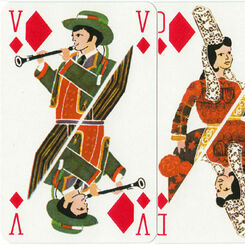
Bretagne
Bretagne (Brittany) playing cards, Grimaud, c.1970.

Jeu de Memoire
Jeu de Memoire card game promoting Véritable Chaumes cheese from the village of St Antoines in south...
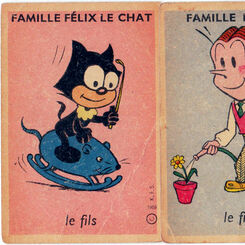
Jeu des 7 Familles
Jeu des 7 Familles © K.F.S. Opera Mundi c.1960.
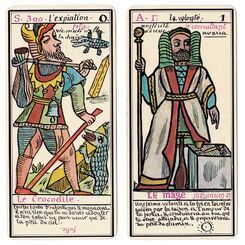
Le Grand Tarot Belline
“Le Grand Tarot Belline” after drawings by Edmond Billaudot (1829-1881).
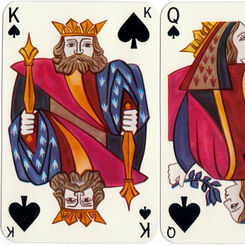
Classique
“Classique” by Draeger Frères, Paris, c.1949 with designs reminiscent of early French cards.

Héron French tarot
French edition of the ‘Bourgeois’ Tarot by Héron.
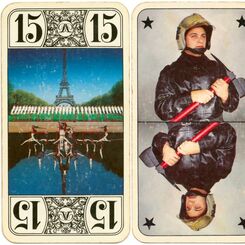
Tarot des Sapeurs-Pompiers de Paris
Tarot des Sapeurs-Pompiers de Paris, a French Fire Brigade tarot deck published by Éditions Dusserre...

Philips Sept Familles
“Philips Sept Familles” promotional happy families game from the 1970s
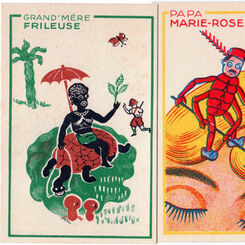
Laboratoires Modernes
Happy Families game by “Laboratoires Modernes” promoting herbal products, c.1929
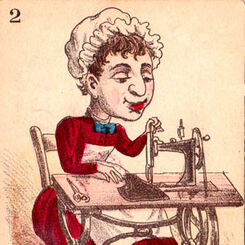
Mauclair Dacier Familles
This “Jeu de Sept Familles” was produced by Mauclair Dacier in the late 19th century.
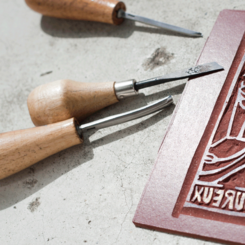
Linocut Printed Tarot Cards
Linocut is a printing technique similar to woodblock printing where a design is cut into linoleum (a...
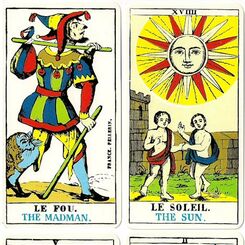
Épinal Tarot
The woodcuts were produced by Francois Georgin (1801-1863), a famous engraver during the Napoleonic ...
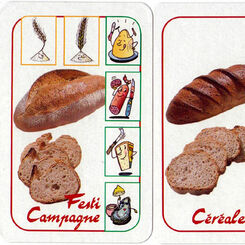
Festival des Pains
Festival des Pains Artisan Boulanger (Artisan Bread Festival), c.2003.
Most Popular
Our top articles from the past 60 days


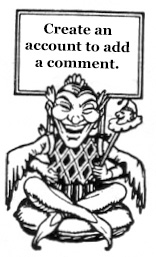 Your comment here. Your comment here. Your comment here. Your comment here. Your comment here. Your comment here. Your comment here. Your comment here. Your comment here. Your comment here. Your comment here. Your comment here. Your comment here. Your comment here. Your comment here. Your comment here. Your comment here. Your comment here. Your comment here. Your comment here. Your comment here. Your comment here. Your comment here. Your comment here. Your comment here. Your comment here. Your comment here. Your comment here. Your comment here. Your comment here. Your comment here. Your comment here.
Your comment here. Your comment here. Your comment here. Your comment here. Your comment here. Your comment here. Your comment here. Your comment here. Your comment here. Your comment here. Your comment here. Your comment here. Your comment here. Your comment here. Your comment here. Your comment here. Your comment here. Your comment here. Your comment here. Your comment here. Your comment here. Your comment here. Your comment here. Your comment here. Your comment here. Your comment here. Your comment here. Your comment here. Your comment here. Your comment here. Your comment here. Your comment here.




















